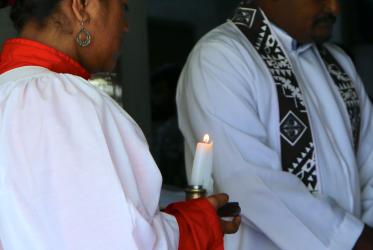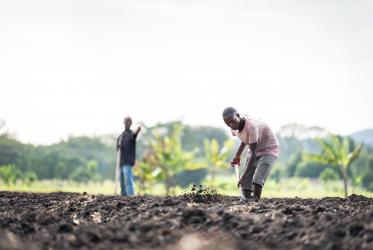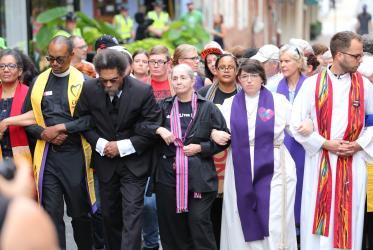AGAPE Consultation, 6 November 2007
More on the 5-9 November 2007 ecumenical consultation in Dar es Salaam
More information on the WCC and Poverty, wealth and ecology
Read a working paper on the study process
Read Marcelo Schneider's report "For an Ubuntu experience in global economy"
Voices from Dar Es Salaam
Report by Marcelo Schneider
"As members of the global economy, we have all been programmed to respond to the human differences between us with fear and loathing and to handle that difference in one of three ways: ignore it, and if that is not possible, copy it if we think it is dominant, or destroy it if we think it is subordinate. But we have no patterns for relating across our human differences as equals. As a result, those differences have been misnamed and misused in the service of separation and confusion".
Audre Lourde's words used in the opening worship of the second day of hearings of the AGAPE consultation, in Dar Es Salaam, gave the hermeneutical framework to the three groups (youth, women and theologians) that dedicated themselves to the task to prepare statements to nurture the upcoming discussions of the proper consultation that would begin the next day.
For William Stanley, a facilitator of indigenous peoples' rights in India, the debates focusing on the AGAPE process show that the churches participating in the ecumenical movement need to demonstrate that they are responsible and capable of taking a critical yet propositive and positive approach to the issues of economic globalization. Stanley, who is one of the participants of the youth hearing, sees that even if he comes from a totally different cultural and religious environment, economic globalization is the same everywhere: "we experience same situations of companies that are establishing their business in our conuntries and aim only profit and the exploitation of the natural resources".
"The hearings are an unique opportunity to reflect on poverty, wealth and ecology in Africa. We want to help understanding how they enable and disable the sustenance of the web of life and of human dignity in the context of economic globalization", said the vice-president of the South African Council of Churches, Puleng Lenka Bula, one of the youngest participants of the theological hearing.
Each groups worked on a statement that is supposed to feed the proper consultation. African concepts such as ubuntu, uzamaa and uzima, for instance, are being used by local theologians as a criteria for contextualization of a biblical based approach to issues of economic globalization: "The Church as the body of Christ has many different members. The text from 1 Cor 12 is especially for us because reminds us that if one member suffers, the whole body suffers", affirmed This contradicts our reality where poor member churches are suffering, but not the worldwide body of Jesus Christ", says the theologians' statement.
The common spirit that arose during the days of the hearings was marked by undestanding and will of story sharing. This is also been seen as a sign of hope for the new epoch of the ecumenical movement. For Neema Mugassa, "our reflections show me that there is a lot of people wanting to join efforts in the Chistian communities. There is sensibilization of youth and women through the ecumenical movement." Mugassa is 26 years old and is a finalist student at the faculty of law in the University of Dar-Es-Salaam, Tanzania.




